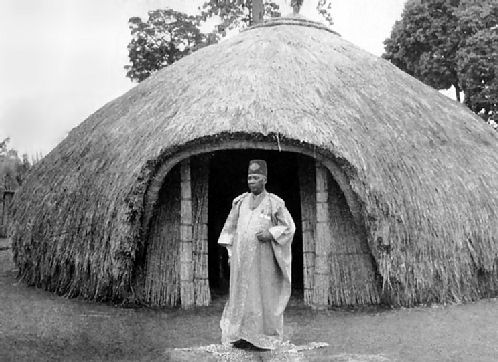
The Mukama Standing Before One of His Palace Buildings
(Department of Information, Uganda Protectorate,
reprinted from Beattie 1960, frontispiece)
Content created: 2007-07-13
File last modified:
Go to Previous file, Next file, Intro & Outline.
Ruling Bunyoro involved more than marching around drinking milk ceremonially. One person cannot settle disputes or distribute goods or manage defense or do anything else for an entire kingdom, still less when ritual obligations compete for time. Thus the actual functioning of Bunyoro required the efforts of a huge number of other people.
The Nyoro mukama dwelled in a “palace” complex of large huts (a muchwa) in a large compound with huge numbers of retainers or courtiers.
These officials include the custodian of the royal graves, men responsible for the more important of the royal drums, caretakers, and “putters-on” of the royal crowns, custodians of spears, stools, and other regalia, cooks, bath attendants, herdsmen, potters, barkcloth makers, musicians, and many others. The more important of them have several assistants, … (Beattie 1960: 31)
For the most part, their tasks were very light, and their numbers were so many that it is hard to imagine any economic need for this bloated and generally inefficient establishment. However, as Beattie examined the situation, he found that many of the offices were hereditary in particular clans, sometimes rotating among different clan members, who considered it a great honor to be associated with the palace.
Thus large numbers of people had an emotional investment in the welfare of the court, and to the extent that they rotated through positions dominated by their clans, even larger numbers of Nyoro found the mukama and his court an important part of their lives.
In some cases long periods of service were rewarded by the mukama with estates, which of course added to the desirability of serving at court. But many positions, including most of the mukama’s many advisers and diviners, were essentially unpaid, and people served just for the glory of it.
Among the most important people in Bunyoro were “chiefs,” who were placed in charge of tracts of land which they administered largely on their own. Nevertheless they were expected to offer unconditional loyalty and support to the mukama and to present him with substantial gifts from the revenues of the estates.

The most important of the chiefs, the heads of the greatest estates, were referred to as “crown wearers” because they were awarded elaborate headdresses decorated with beads and the skins of colobus monkeys. This great honor came in response to their having offered some extraordinary service to the mukama, such as winning a great battle.
Unlike many other honors, crowns remained hereditary in a male line forever, so the inheriting son of a crown wearer was also a crown wearer. Like other vassals, crown wearers swore oaths of loyalty to the mukama and drank milk ceremonially with the him. Unlike the others, they agreed to observe the mukama’s same food taboos.
The mukama granted considerable independence to many “great chiefs” who had personal bonds to him.
There is a Nyoro word, Mahano, denoting a special kind of spiritual power, which is applied to many objects and situations which are strange and awe inspiring. This mysterious potency may be dangerous, calling for the performance of special ritual to preserve or restore normality. It is especially associated with the Mukama; therefore, when he delegates political authority upon his chiefs, he also imparts to them something of his own ritual power. Thus the delegation of political authority is not just an administrative act, it is also a ritual act. The ritual involves, in particular, a ceremony known as “drinking milk” with the Mukama, and it is said that (in the case of important chiefs, at least) the milk formerly was taken from the cows of his special herd. (Beattie 1960: 29)
Drinking milk was not done only once. On the contrary, the leaders of Nyoro society had continuing obligations to appear before the mukama and drink milk with him. One effect of this was of course to make it difficult for a retainer to develop an alternative power base in a distant region when he had to keep traveling back to the mukama’s compound to make a show of his loyalty. Indeed, most of the great lords seem to have found it easiest simply to remain at the mukama’s compound nearly full-time.
Go to Previous file, Next file.
Return to Intro & Outline, top of page.